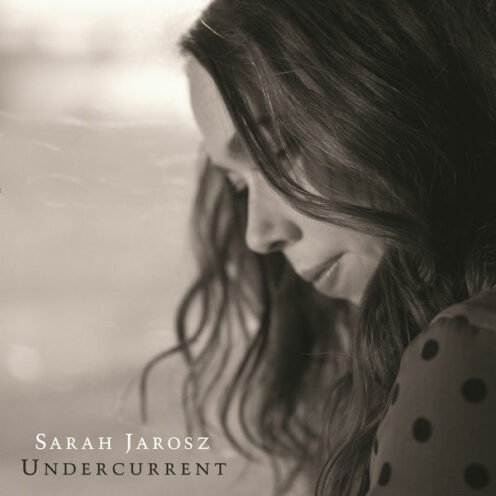
Texas Americana artist Sarah Jarosz is only 25 years old—and recently 25, to boot—but she already has four albums under her belt. Her third, 2013’s Build Me up from Bones, even earned a Grammy nomination for Best Folk Album. It’s with her fourth album, the brand-new Undercurrent, that Jarosz is making a case for herself as one of the finest artists in the genre. On the last album I’d have argued that the best song was a cover of Bob Dylan’s timeless “Simple Twist of Fate”—already one of the best songs Dylan ever wrote. Here, all 11 songs are originals, and they showcase new depths of confidence for Jarosz. Even when she’s working with co-writers, everything on Undercurrent feels bent to the same artistic vision.
If Undercurrent sounds more grown-up (for lack of a better word) than Jarosz’s earlier work, there’s a reason. When Build Me up from Bones came out, Jarosz was just 22 years old, still in the midst of the transition from young adulthood to actual adulthood. As the press release for Undercurrent states, this is the first album that Jarosz has written and recorded since finishing her schooling (a graduate of New England Conservatory of Music, Jarosz is classically trained) and moving out to New York on her own. The singer/songwriter even says that Undercurrent is “the first record I’ve ever made that feels to me like a complete thought,” noting the lack of covers and the effort she put into getting the sequencing just right.
The result is an album that very genuinely reflects the roller coaster of growing up and trying to figure out how to be an adult. Sometimes, the journey is euphoric, as on the blissful and lovelorn “Green Lights.” Other times, the trek gets forlorn and desperate. “Lost Dog” in particular is a heartbreaker. Whether you read the song as an actual plea to a wayfaring pet or as a metaphor for a lover who strays, “Lost Dog” cuts to the core. “Home’s not a word you say/Something made you stray off like a feather in the wind,” Jarosz sings in the second verse, before asking “If I open my door, make you my friend/Are you gonna run out and get lost again?” It’s a song that aches with loneliness, regret, and mistrust—all themes that run through the rest of the record.
While those themes are heavy, though, Undercurrent ultimately ends up being an uplifting album for how Jarosz finds strength and resilience within the dark parts of life. Becoming an adult is always a journey that is going to have dark patches, but learning to pick yourself up, dust yourself off, and carry on is what separates the success stories from the failures. Whether Jarosz is rebuffing an ex-lover (as on the Civil Wars-esque “House of Mercy”) or drawing fortitude from music (the infectious “Comin’ Undone”), she makes it through with tuneful attitude and plenty of charisma. The battle-hardened woman who Jarosz becomes in these songs only makes the moments of stripped down tenderness—especially the delicate alt-country of “Take Me Back”—that much more effective.
The way Jarosz wrote, arranged, recorded, and sequenced Undercurrent mirrors the thematic balance between presenting a tough exterior and letting intimacy in. Four of the songs here are entirely solo—including the album’s opener and closer (“Early Morning Light” and “Jacqueline”) as well as “Everything to Hide” and “Take Another Turn.” All four songs present nothing but Jarosz’s vocals and acoustic guitar and sounds like it could have been recorded live in a single take. Elsewhere, Jarosz brings in a band to flesh things out, or counts on co-writers and close collaborators to add extra texture to the music. The collaborator list is incredibly strong, featuring everyone from Guster’s Luke Reynolds (who provides vocal harmonies on “Green Lights”) to Nickel Creek’s Sara Watkins (“Still Life”). Perhaps most noticeably, Parker Millsap provides a co-write and backup vocals on “Comin’ Undone,” a song that wouldn’t have sounded out-of-place on his early-2016 triumph The Very Last Day.
Unlike some other albums, though, where guest spots and co-writes can feel like they are dampening the artist’s vision or voice, with Undercurrent, everything feels organic and intentional. Jarosz wanted this album to play like “a complete thought,” and every choice she makes plays into that goal. The result is an album that pairs the meticulous ambitions of an artist who is growing in assurance and talent with the live, spontaneous aesthetic that makes folk music so great. It’s a triumph.